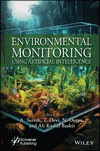Fundamentals of AI and NLP in Environmental Analysis
Summary
Recent advancements in Artificial Intelligence (AI), Natural Language Processing (NLP), and Artificial Intelligence of Things (AIoT) have created transformative opportunities to enhance and optimize the environmental performance of smart cities. This study employs a unified evidence synthesis framework that integrates aggregative, configurative, and narrative synthesis methods, providing a comprehensive analysis of the impacts of AI, NLP, and AIoT on environmental sustainability in urban areas. The study delves into critical research questions concerning the core principles of emerging smarter eco-cities, including their design, infrastructure, and governance models. It also explores the key drivers behind the realization of these eco-cities, such as technological advancements, policy initiatives, and societal demands for sustainable living environments. Furthermore, the study investigates the primary AI, NLP, and AIoT solutions that contribute to environmental sustainability practices in smart cities. This includes technologies like predictive analytics for energy efficiency, smart waste management systems, and AI-powered urban planning tools that optimize resource allocation and reduce environmental impact. The findings of this study enrich our understanding of how AI, NLP, and IoT technologies can positively impact sustainable urban development. However, they also highlight the challenges associated with their implementation, such as data privacy concerns, technological dependencies, and the need for interdisciplinary collaboration among stakeholders. Overall, these insights empower policymakers, urban planners, and technology developers to advance the integration of eco-urbanism and AI-driven urbanism. By making more informed decisions and designing policies that prioritize environmental well-being, stakeholders can create smarter and more sustainable cities for the future.



